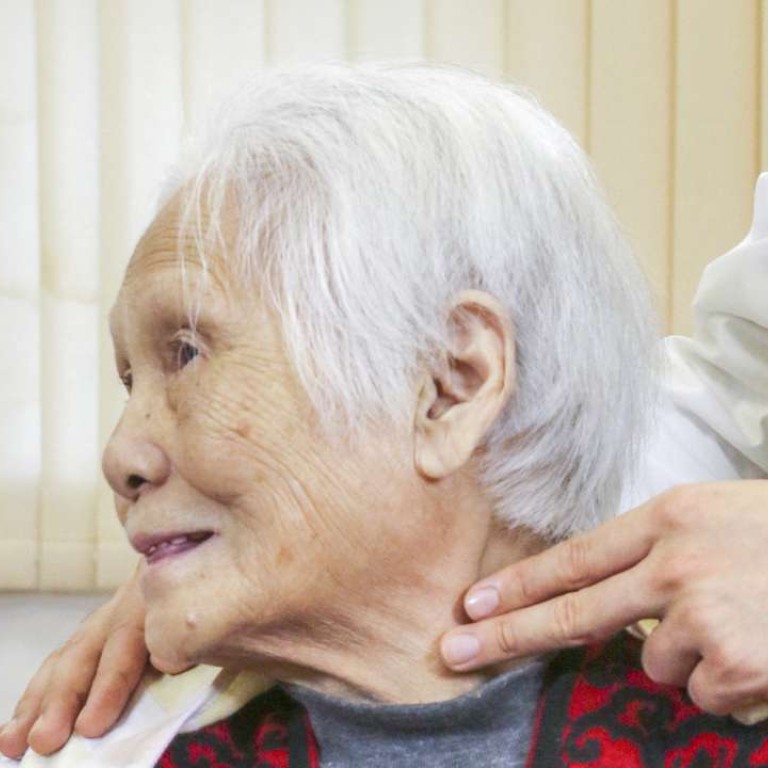
Help Hong Kong’s elderly – learn the 12-step ‘comfy acupressure’ massage
The 15-minute treatment was designed by a professor of Chinese medicine to improve the physical and psychological well-being, and free DVDs and training courses are available
As the population ages and the burden on Hong Kong’s public health system increases, cost-effective methods to improve the quality of life of the city’s elderly could help alleviate the strain. A 15-minute, 12-step pressure point massage designed by a local traditional Chinese medicine professor that’s simple enough to be administered by an informal caregiver has shown to be a viable aid.
In tests on more than 130 frail elderly people who received the acupressure massage four times a week for 12 weeks, researchers from the University of Hong Kong in collaboration with Yan Chai Hospital’s social services department found the treatment improved both the physical health and psychological well-being of the participants.
Called “comfy acupressure”, the protocol was designed by Dr Li Lei, an assistant professor of Chinese medicine at HKU, who based it on traditional Chinese medicine (TCM) theory and his more than 35 years of clinical experience in acupressure and acupuncture. The sequence mainly concentrates on acupoints on the face, head, neck and shoulders. It’s non-invasive, drug-free, requires no equipment and has low risk of side effects.
“Comfy acupressure can improve the blood circulation, brighten the senses and release the stress of the frail elderly, and therefore improve their psychological well-being. They can perform better in daily activities and lead a better social life,” says Li.
Comfy acupressure can improve the blood circulation, brighten the senses and release the stress of the frail elderly, and therefore improve their psychological well-being
“Comfy acupressure is a 12-step acupressure method which is easy to learn and safe to use, and it provides a viable non-pharmacological treatment for elderly with chronic diseases.”
Based on the beneficial results of comfy acupressure, the researchers have recommended promoting it as a complementary treatment by providing training and support to those caring for old people. This week Yan Chai Hospital began distributing comfy acupressure training manuals with a DVD to interested parties for free, and training courses (two two-hour sessions) for the general public will be launched in July this year.
Acupressure is a TCM technique that dates back more than 2,000 years and is based on the same ideas as acupuncture. Instead of needles, however, pressure is applied to specific points on the body’s surface by hand, elbow, or with the aid of various devices.
These specific pressure points, which may be a distance from the actual location of the troubling symptoms, lie along meridians – pathways in the body that are said to circulate vital energy called qi. According to TCM, blockage of this energy flow, or an imbalance in yin and yang, can cause illness and pain. Acupressure is said to help send a signal to the body to “turn on” its own self-healing or regulatory mechanisms, to correct functional imbalances and restore the flow.
Click to learn more about meridians and pressure points
Previous scientific research has shown acupressure applied to various parts of the body to benefit a range of ailments both physical and mental, including constipation, cognitive function in people with mild traumatic brain injury. It can lower anxiety levels of children undergoing surgery, and reduce lower back pain.
In two separate studies conducted between November 2014 and March 2016, 79 pairs of frail elderly people with an average age of 76 and their caregivers in old people’s centres, and 56 qualified frail old people with an average age of 83 in care and attention homes, received comfy acupressure four times a week for 12 weeks. Two massages were administered by a registered TCM practitioner and the other two by a designated informal caregiver who had been trained. The participants’ conditions were measured before, immediately after and three months after the trial.
Findings show the treatment significantly improved general quality of life, reducing the intensity and frequency of pain and improving sleep quality and mood. The treatment reduced physical limitations, enhanced vitality and improved social functioning.
There were 5 per cent and 30 per cent improvements respectively in the physical domain and physical-pain-induced constraints in the community . There was an 8 per cent increase in patients’ satisfaction in their ability to perform activities in their daily lives.
Forty-two per cent of the caregivers in the community were spouses of the participants and were of a similar age and were stressed by their caregiving duties. The researchers found the caregivers’ strain and stress levels were reduced by more than 20 per cent after treatment.
The researchers say the benefits not only apply to the elderly but also to adults and children who may be facing stress, insomnia, or some sort of chronic bodily pain.
These are the 12 steps in the massage:












Comfy acupressure manuals and DVDs are being distributed free of charge by Yan Chai Hospital’s social services department. To obtain one and for enquiries, call Shirley Chan at 2409 2888 or email [email protected]. Comfy acupressure training courses for the public will begin in July 2016, more information at ychss.org.hk.

